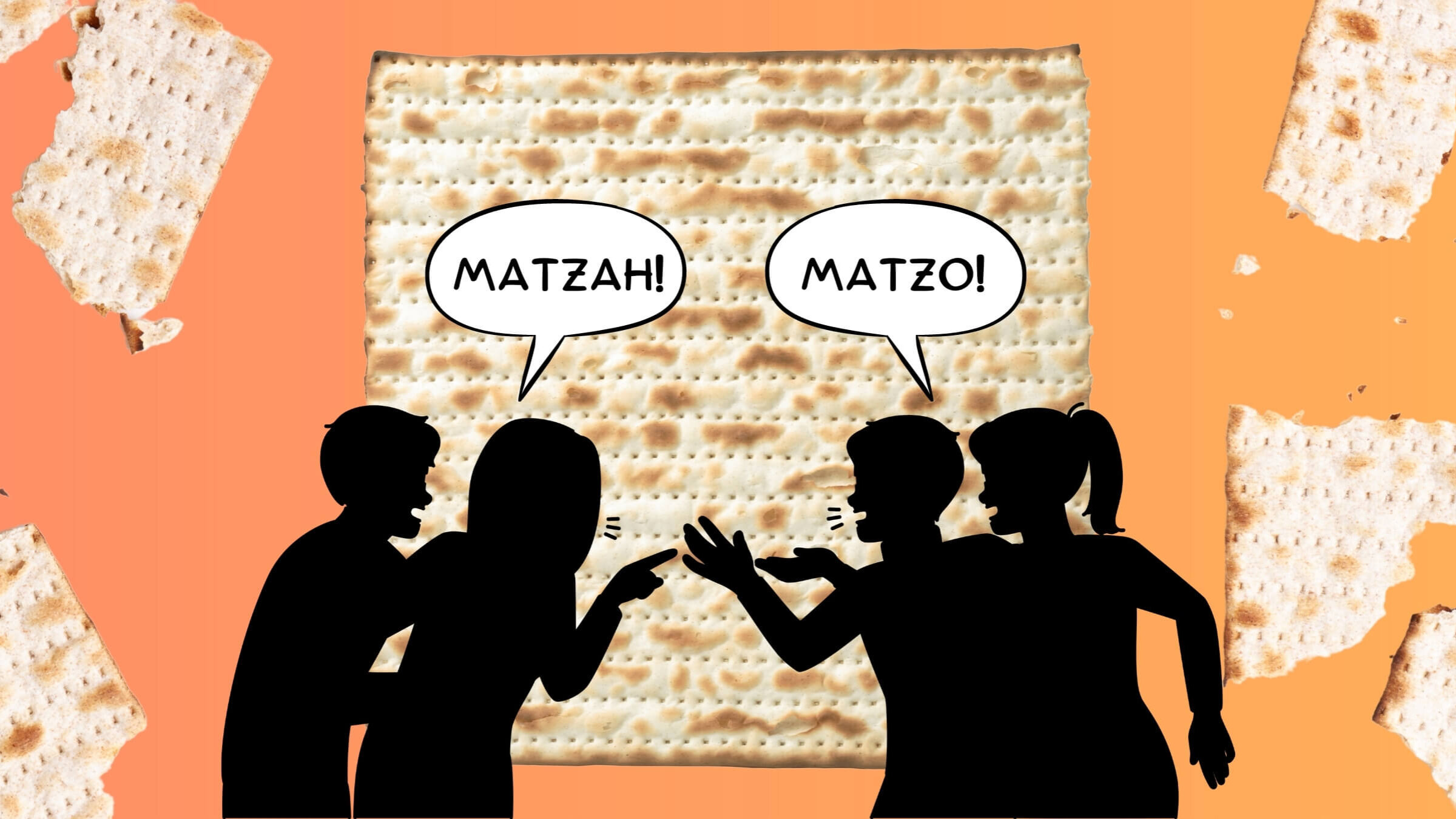You say matzah — and matzo and matzuh and matzee and more
Readers respond to our editor-in-chief’s column about a Passover copy-editing conundrum

Reasons for preferring “matzah” or “matzo” don’t always just come down to personal taste. Photo-illustration by Matthew Litman/Forward. Photos via iStock/motimeiri and iStock/vladi79
Barbara Berman of Ohio declared that it “has always been, and will continue to be … matzah,” though she is wondering what ever happened to the egg-and-onion variety. But Lynn Hirshman, who lives in Denton, Texas, described herself as a proud, third-generation adherent of “matzo.” And Ayal Sharon wondered why anyone would need to choose: “Variety is the spice of life,” he noted.
These were among the 132 musings and missives that poured in from readers responding to our editor-in-chief’s most recent column about how the Forward should render the name of the unleavened bread products Jews eat on Passover (and, apparently, that some Christians use for Communion.)
Our respondents included rabbis, cantors, lawyers, linguistics professors, editors and octogenarians from as far away as England and Israel. This profoundly unscientific survey tilted firmly in the direction of matzah, which is considered more modern, more directly connected to Hebrew, and more inclusive of Sephardic and Mizrahi Jews. More than three times as many of you preferred the spelling of “matzah” over “matzo”; some suggested alternative spellings altogether, including matzoh, matzuh, the Boston-accented matzee and the perhaps Italian-inspired mazza.
“Personally, I prefer the Yiddish ‘matzeh,’ which is how I’ve always pronounced it,” said one Canadian reader, Goldie Morgentaler. “Here in Alberta, no one knows what it is anyway, so I can pronounce it any way I like and people still won’t know.”
Who knew that this copy-editing conundrum would inspire such an outpouring of personal stories and family histories, miniature lessons in linguistics and some hilarious one-liners.
Here is a selection of your responses, edited for length and clarity:
It’s Matzah, I tell ya!
I grew up with “matzah” and, at 90 years old, I’m not going to change.
— Florence Gurwin
I do love my country very much, at least on the good days, and I appreciate and respect the traditions which inform Jewish life in the United States. But when it comes to Hebrew, the way it is spoken in Israel should be our guide. It is the reason why our Hebrew schools, the Orthodox ones notwithstanding, no longer teach Ashkenazi-inflected Hebrew.
Matzo may be time-honored, but it is time to change. Do you still wear the same clothing styles that your mother wore? I doubt it.
Be a leader, not a follower. Go with matzah and matzot. Is there anything more ludicrous than matzos?
— Rabbi Martin P. Beifield Jr.
The column didn’t mention the spelling in the Haggadah, so I checked my Haggadah collection and, yes, most (including a 1981 edition of the famous Maxwell House version) use “matzah,” with some more recent ones using “matzoh,” including a 2013 Maxwell House edition (except for the index which accidentally uses “matzah”).
— Ted Hochstadt, Falls Church, Virginia
As a Jew whose parents fled Egypt a second time, I grew up saying “matzah” (and brit, Shabbat and… matzot).
Many of us strive so hard to be inclusive; why not be inclusive of our own Sephardi/Mizrachi community? Admittedly it’s only a small percentage of American Jewry, but it’s about half of Israel’s population.
More importantly, as a nation, we now have a common language — modern Hebrew — so even Ashkenazic Israelis have, maybe wistfully, adapted to saying “matzah” (and brit and Shabbat). Surely it’s time this publication did the same.
— Gilles Sion
Matzah is absolutely more inclusive at a time when Judaism is striving for just that, and we’ve already come late to the party. Language can choose to reflect its time or direct its time. As a publication that is trying to present itself as contemporary, shouldn’t you be leading the pack rather than following it?
— Cantor Deborah Johnson
Matzo ‘belongs to me and my Jewish heritage’
“Matzo” represents the way Ashkenazi Jews, who comprise the vast majority of American Jews, pronounced the word for most of the last thousand years. The idea that “matzo” is “odd” reflects ignorance and lack of respect for hundreds of years of Jewish history and culture.
— Cecile E. Kuznitz, associate professor of history, Bard College
Matzo. It feels like I am connecting with my ancestors, seeing the word, and knowing what it means, is special and it belongs to me and my Jewish heritage. It’s of the old world, archaic in a good way.
— Myranne Janoff, Woburn, Massachusetts
Matzo. “Matzah” is very specifically non-Yiddish, non-Ashkenazic. “Matzo” is not only historic (and English-language spelling is nothing if not historic, as opposed to phonetic), but also kind-of neutral in that respect (in that it is neither Yiddish nor modern Hebrew/Sephardic).
— Jim Feldman, Forward board member
‘Two Jews arguing and there are three sides’
Why not “matza”? That’s the best compromise as I see it!
— Ruth Jaffe
This seems to follow that of the old joke: two Jews arguing and there are three sides.
I have just been reviewing the emails and recipes I have in my Passover folder and found myself doing the same thing. I use “matzo,” “matzah” and “matzoh” interchangeably. I even discovered that Jamie Geller of Aish used “matzo” in one recipe and “matzah” in another.
Verbally, it is always “matzah” and whether covered with butter, cream cheese and jelly, or made into matzo brei, no one really cares about the spelling.
— Lynne Savage
I prefer “matzah” but honestly, I kind of like the fact that transliteration varies. It gives us something to argue about. After all, the only “correct” spelling is מצה.
— Harold Rosenthal
Matzuh, matzee, matzza, oh my!
If your family is from Boston, maybe you had an elder who called it “matze” (mutt-see). After all, during the rest of the year they ate “challe.”
As far as the plural goes, I’ve been singing this with my religious school students: “We need the Haggadah/ We need the three matzot/ But the people ’round the table are what we need the most!”
— Sharon Brown Goldstein, Hopkinton, Massachusetts
My grandmother was from the west side of Chicago. She and everyone else of her era (including the next generation, my mom and her pals) called it “matzee.” They used a double E sound (like weep) for everything! We grew up saying “sit shivee,” Shabbat chalee, latkees, etc.
— Sue Hanover
English already has too many words that have spellings different from their pronunciation. If we say “matzah,” we should spell it that way. However, it seems we really pronounce it “matzuh.” No support for that spelling, I suppose.
— David Sobelsohn, Washington, D.C.
My Ashkenazi family in London, England (ex-Lublin, Poltava and Zbarazh in western Ukraine) all say motza. It sounds like “boxer.” The first vowel is pronounced as in “drop,” the second is a phonetic schwa, as in the first syllable of balloon.
Surely we can’t be alone in this? Or can we?
— Jeff Segal
I want to challenge the claim that “exactly nobody” would ever say matzos. Those of us who daven, bentch or read the Torah certainly say it! The name of the holiday in all of them is “chag ha-matzos” — we say it all the time. I know the column was about the right spelling/syntax in English, but can Trader Joe’s really be faulted for transliterating and using a word that normative Jews have used forever?
Anyway, there’s my two cents’ worth. Feel free to sweep it out with the rest of the chametz.
— Jeff Jacoby
I say, in tribute to our Italian friends and neighbors (and yes, family) who gave us pizza and so much more, let us proud New York-based American Jews just start calling and spelling it “mazza.”
— Mendy Hecht
I grew up in a Hebrew–speaking home. My grandparents were Yiddish-speaking Holocaust survivors from Poland. So I don’t mind hearing both. Variety is the spice of life, and there is nothing wrong with preserving this little (and trivial) example of diversity.
— Ayal Sharon
























